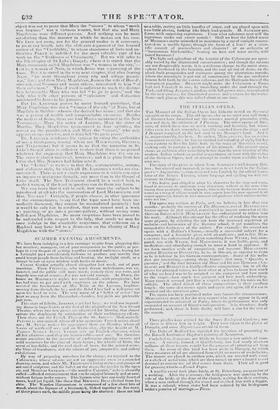THE ITALIAN OPERA.
'Pia Manager of the Italian Opera has hitherto rested on the vocal strength of his corps. The old operas t for so we must now roll them) of HOSSIN1 have finnisbed nut the season's musical provender, with, now and then, the addition of / Parlloni. The other operas of BEL- LING of which there was so Ill1111 cracking and boasting, but whose titles even SVC don't remember, speedily vanished from the stage ; and I Litiyanti remained as the last card in the :Manager's band. And it is, unquestionably, his bust. Its author. rJEacyoyx.rn, has no genius —no power to create; he has no !narked individuality of stvle, but has been content to float his little bark in the wake of Bossier's vessel, seeking only to partake a portion of his triumph. His present opera shows an ambition after something better than the mere frivolity of tine modern Indian school—a partial acquaintance at least with the riches of the Gentian Opera, and an attempt to render them available to his own use, The story of the piece is taken flout Scturame's well-knows Rob- bers; but altered and improved, hi manner as is set forth in the Italian poet's " A rgomento,"—t nits rendered into English by the official trans- lator of the King's Theatre, whose language and spt Him; we will riot venture to change-
" The Italian poet obliged to adapt his characters fur the stage and songs, found it rweessary to ameliorate some characters, without at the same time loosing their proximity : those In igands, who in the Iierman drama are repre- sented as it tniop of viliians stupid in vice, appear here like men opposed to all unjust oppression, friends to that innocent independence which violates neither order our law."
The opera was mitten at Paris, and, we believe, in less than two months : probably the success of The Huguenots, and of AI former operas in that capital, contributed to impart somewhat of the German flavour which MEncanoNTI: has endeavoured to infuse into his work. Although this attempt has the effect of rendering the opera more piquant, by relieving the ear from the incessant repetition of melodies and harmonies of the Bossier school, it yet manifests the comparative feebleness of the atelier. For example: the second act opens with a Rubber's Chorus,—usually a suceessful subject for a composer, and a favourite piece with an audience; and in this Meat- CADANTE has endeavoured to glean something from WEBot; hut, com- pared, not with Wm:rn, but MARSCIINER, it was feeble, poor, and ineffective—not stimulating enough to move a hand in applause. If we form another scale of comparison, and measure AI roma DANTE against BELLINI or Doer/mere he is, in this act, as superior to them as he is inferior to his German contemporaries. Some of his melo- dies are iuteresting.—among them, Getses first song, " Quando, o guerrier ;" mid the duet between old Allier and his son Hermann ( 14A- 111.At711E and RumNil is a highly-effective composition but in all the pieces for principal voices, we were often at a loss to know how much of what we heard was to be assigned to the composer and bow much to the singer—how much was garment and bow ninch err4broidery. Mikity times it scented just like a singer's exercising his voice on his solfegii. The chief defect of these compositions is their needless length : the same idea revers again and again and again, till ti. e ear is wearied and the attention gone. The opera has been produced under very favourable circumstances. AIERCADANTE wrote it fur the very singers who now appear in it, and superintended its rehearsal at Paris; where its performance was only suspended on account of Guises indisposition. It is, thereftee, finely performed; and, there is little doubt, will have a run fur the rest of the season.


























 Previous page
Previous page